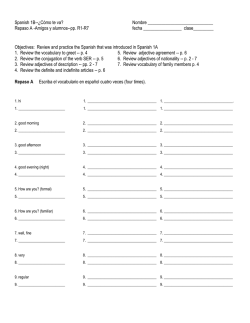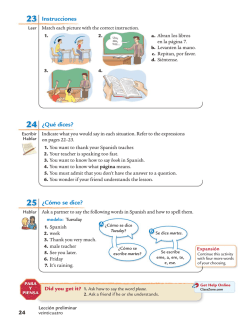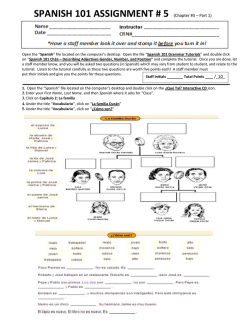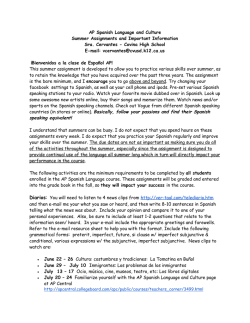
GONZALO AGUIAR-MALOSETTI
CURRICULUM VITAE GONZALO AGUIAR MALOSETTI, Ph.D. 136 E. 3rd St. Oswego, NY 13126 [email protected] (315) 532-7393 (cell) (315) 216-6758 (home) EDUCATION AND DEGREES WASHINGTON UNIVERSITY IN ST. LOUIS, MO Ph.D. in Romance Languages and Literatures, August 2010. Thesis: Campos magnéticos de la modernidad latinoamericana: una historia intelectual de Argentina, Brasil y Uruguay (1900-1935). Thesis Director: Mabel Moraña Specialization in 20th Latin American literature (Spanish and Portuguese). WASHINGTON UNIVERSITY IN ST. LOUIS, MO M.A. in Spanish, May 2005. FACULTAD DE HUMANIDADES Y CIENCIAS DE LA EDUCACIÓN, Montevideo, Uruguay B.A. in Latin American literature and Literary Theory, April 2003. ACADEMIC POSITIONS ASSISTANT PROFESSOR OF SPANISH AND PORTUGUESE, State University of New York at Oswego (Fall 2014-) COORDINATOR OF SPANISH 101-102 SUBSECTIONS, Washington University in St. Louis (Fall 2011-Spring 2013) Administrative responsibilities include interviewing and hiring qualified undergraduate students to teach subsections of Spanish 101-102; holding meetings and training sessions over the academic semester; creating weekly assignments and new topics for 101-102 syllabi; supervising both lesson plans and quizzes created by subsection instructors; observing subsection instructors teaching in their classes throughout the semester; collecting weekly attendance reports from subsection instructors. A great deal of instructional technology was involved, including the administration of Vistas Supersite (online homework) for Washington University undergraduate students taking the sequence of Spanish 101-102. LECTURER IN SPANISH, Washington University in St. Louis (Fall 2011-Spring 2014) LECTURER IN LITERARY THEORY, Washington University in St. Louis (Summer 2013) VISITING ASSISTANT PROFESSOR, Tulane University (Fall 2010-Spring 2011) GONZALO AGUIAR MALOSETTI SENIOR TEACHING ASSISTANT, Washington University in St. Louis (Spring 2010) In charge of a preceptorial class on Cuban literature and culture (1500s up to the Special Period in the 1990s). GRADUATE TEACHING ASSISTANT, Washington University in St. Louis (2004-2008) Acquired a great deal of experience by teaching a wide variety of Spanish courses at all levels. Taught courses ranging from Spanish 101 to upper-level courses in Spanish-American Literature. Responsible for teaching and developing syllabus and reading materials for Spanish 336, Spanish American Literature II. LECTURER IN LITERARY THEORY, University of the Republic in Montevideo, Uruguay (20002004). FELLOWSHIPS AND AWARDS The Eva Sichel Memorial Prize for Best Essay in Spanish: “¿Cómo enunciar la modernidad en la cuestión de género?: Para un esquema tropológico de El veneno del arte, de Carmen de Burgos.” Washington University in St. Louis. May 3, 2005. Bryant Travel Fund to pursue archival work in Rio de Janeiro, Brazil. June 2009. Washington University in St. Louis Writing in the Americas Summer Institute at Boston University. “The Place of Literature: A View from the South.” Prof. Alicia Borinsky in charge. Boston, MA. Summer 2004. Honorable Mention for the manuscript titled AlfredoMario Ferreiro en la vanguardia: el fenómeno del humorista lúcido en el contexto de la modernidad uruguaya. Annual Literary Awards at the Ministerio de Educación y Cultura in Montevideo, Uruguay. 2003. Honorable Mention for the novel entitled La música de Mateo. Premio Posdata de Novela. Montevideo, Uruguay. 2000. CERTIFICATES Teaching Citation awarded by the Dean of Arts & Sciences. Washington University in St. Louis. October 2009. (An optional program for Washington University Ph.D. students who pursue teaching experience and expertise beyond the requirements of their departments and of the Graduate School of Arts & Sciences.) Page 2 of 11 PUBLICATIONS GONZALO AGUIAR MALOSETTI Book Chapters: “Triumph of the Will: Annihilation of Ariel in Manuel Gálvez’s Calibán.” Rethinking Intellectuals in Latin America. Ed. Mabel Moraña. Madrid and Frankfurt am Main: Iberoamericana / Vervuert, 2010. 65-87. Print. Peer-Reviewed Articles: “La Inquisición portuguesa en sesión: arte, poder y resistencia en O Judeu, de Jom Tob Azulay.” (in coauthorship with Prof. Joseph Schraibman). Hispanic Review 78.1 (2010): 10122. Print. “El cocoliche y la sutura de la deuda simbólica en Stéfano y La Nona.” Latin American Theatre Review 41.1 (2007): 7-31. Print. Articles Published Abroad: “La Inquisición portuguesa y la refutación perversa del sujeto colonial: el caso de O Judeu (1996), de Job Tom Azulay.” (in coauthorship with Prof. Joseph Schraibman). MaguénEscudo 151 (2009): 40-59. Print “Recuerdos del futuro: cultura visual y utopía poshumana en Mantra (2001), de Rodrigo Fresán.” Más allá de los (pos)tulados. Reflexiones sobre posmodernismo, posformalismo, poshumanismo, posestructuralismo, posmitología, poshistoricismo y poscolonialismo. Ed. Silka Freire. La Plata, Argentina: AlMargen, 2009. 49-72. Print. CONFERENCES Session Chair “Webs of Power / Redes del poder.” IV South by Midwest International Conference on Latin American Cultural Studies. Washington University in St. Louis. March 28, 2013. Saint Louis, MO. A session devoted to biopolitical issues of contemporary Latin American literature and culture. Session Chair and Panelist “Paradojas del hombre nuevo: construcción de la fábula de la Revolución cubana en la obra de Ezequiel Vieta.” Radical Caribbeans / Los Caribes Radicales: Repositioning Caribbean Life. Tulane University. October 5, 2013. New Orleans, LA. Page 3 of 11 GONZALO AGUIAR MALOSETTI “Bajo la larga sombra del caudillo: política y hegemonía en El fiscal (1993), de Augusto Roa Bastos.” Latin American Studies Association (LASA). May 24, 2012. San Francisco, CA. Discussant “Sobre el género policíaco.” Latin American Studies Association (LASA). May 27, 2015. San Juan, Puerto Rico. Panelist “Ética del homo economicus en La Bolsa (1891), de Julián Martel.” Kentucky Foreign Language Conference (KFLC). April 24, 2015. Lexington, KY. “Turning ‘Our America’ Into a Text of Multiple Authorship: Frank Tannenbaum and the Daunting Task of Translating Latin America during the Cold War.” The Southeastern Council of Latin American Studies (SECOLAS). March 13, 2015. Charleston, SC. “Entre fariseos y clérigos: el sentimiento trágico de la función intelectual en los escritos políticos de Leopoldo Lugones.” Latin American Studies Association (LASA). May 22, 2014. Chicago, IL. “’Excluidas por naturaleza’: género y marxismo en Parque Industrial (1933), de Patrícia Galvão.” Panel on 20th-Century Luso-Hispanic Political Literature. Midwest Modern Language Association (M/MLA). November 10, 2013. Milwaukee, WI. “La lección del maestro: prácticas cívicas en Alfonso Reyes y Carlos Vaz Ferreira.” MidAmerica Conference on Hispanic Literatures (MACHL). October 29, 2010. Saint Louis, MO. “A Long Border That Must Be Reopened: Brazilian Literary Field as a Thorn in Ángel Rama’s Side.” Latin American Colloquium Series. November 2, 2009. Washington University in St. Louis. Saint Louis, MO. “El bufón de la corte (estatal): función intelectual en Lima Barreto y Julio Herrera y Reissig.” Latin American Studies Association (LASA). June 12, 2009. Rio de Janeiro, Brazil. “Enunciaciones como denunciaciones: el intelectual periférico y las políticas de ordenamiento cultural en la era del ‘subdesarrollo’ latinoamericano (el caso de Brasil, Argentina y Uruguay).” First Spanish Graduate Conference at Washington University in St. Louis. November 2007. Saint Louis, MO. TRANSLATIONS Revised translation of “As ciências sociais e o inglês” / “Social Sciences and the English Language,” by Renato Ortiz. In Rethinking Intellectuals in Latin America. Ed. Mabel Moraña. Madrid and Frankfurt am Main: Iberoamericana / Vervuert. 2010. Page 4 of 11 GONZALO AGUIAR MALOSETTI “The Ebbs and Flows of Negritude among Brazilian Hip Hoppers: Cultural History and Interpretation in Latin America’s Blackest Nation” by Prof. Derek Pardue (Washington University in St. Louis). From English and Portuguese to Spanish. In Cultura y cambio social en América Latina. Ed. Mabel Moraña (Washington University in St. Louis / South by Midwest). 2008. WORKS IN PROGRESS Intelectuales, sociedad civil y campo cultural. Argentina, Brasil y Uruguay (1900-1935) [Intellectuals, Civil Society, and Cultural Field. Argentina, Brazil, and Uruguay, 19001935] (Book manuscript under final revision) “Holding the Barbarians at the Gates: Apropos Alfonso Reyes’s Cartilla moral.” (Article) “El largo viaje hacia el origen de la tiranía en El fiscal, de Augusto Roa Bastos.” (Article) RESEARCH INTERESTS Latin American Intellectual History / Law and Literature / Immigration in the Southern Cone / Cultural Studies / Culture and Power / Literary Theory / 19th and 20th century Latin American Literature / Culture and State Formation / Ethics / Brazilian Studies / Nationalism / Citizenship / Postcolonial Studies / Public Sphere / History of Ideas / Spanish and Spanish American 20th century novel / Latin American Theatre / Paraguayan literature and culture /. TEACHING EXPERIENCE Graduate Courses SPANISH 6540: Intellectuals and Powers in Latin America (Spring 2011, Tulane University). A graduate seminar. A survey of fictional works dramatizing the relationship between intellectuals and powers in Latin America, including Brazil. It includes literary works by José Mármol, Alberto Blest Gana, José Enrique Rodó, Lima Barreto, Augusto Roa Bastos, Raul Pompéia, Roberto Bolaño, Luisa Valenzuela, Diamela Eltit, and Mario Vargas Llosa. Undergraduate Courses Taught Abroad SPANISH 311: Hispanic Culture and Civilization I (Summer Language Institute in Madrid, Summer 2006). A survey on Spanish literature and culture from the Roman Empire to Spain Page 5 of 11 GONZALO AGUIAR MALOSETTI in the late 1990s. Responsible for all aspects of course instruction, including selection of readings, films, and group activities based on cultural trips across southern Spain. Under a Fellowship Program Does the World Exist to End Up As a Book?: Interpreting the Text in Contemporary Literary Theory and Criticism. Merle Kling Undergraduate Honors Fellowship Program (Washington University in St. Louis, Summer 2013). A twenty-hour course conducted in English. The course was designed for undergraduate students pursuing a degree in Humanities. The course was composed of discussions on the major theoretical points of key moments in 20th and 21th century literary theory and criticism, followed by practical applications of the theory into selected texts of Spanish American literature. Preceptorials SPANISH 442: Preceptorial for Cuban Literature and Culture (Spring 2010, Washington University in St. Louis, Prof. Elzbieta Sklodowska in charge). Responsible for providing a historically as well as culturally contextualized information on Cuba from colonial times to the Período especial in the 1990s. Undergraduate Courses At SUNY Oswego SPANISH 495: Murders as Political Acts: Solving Puzzling Cases in Latin American Detective Fiction (Spring 2015) SPANISH 202: Intermediate Spanish B (Spring 2015) Spanish 101: Continuing Elementary Spanish (Spring 2015) SPANISH 352: Survey of 19th to 21st Spanish American Literature (Fall 2014). Close reading of key texts in the formation of national identities, with a particular emphasis on racial, gender, and political issues. SPANISH 201: Intermediate Spanish A (Fall 2014). SPANISH 102: Continuing Elementary Spanish (Fall 2014). Page 6 of 11 At Tulane University GONZALO AGUIAR MALOSETTI SPANISH 4050: Modern Readings in Spanish (Fall 2010, Spring 2011, Tulane University). A survey of modern Hispanic cultures from 1800 to the present. From Romanticism to Latin American Boom. SPANISH 3040: Advanced Grammar and Composition (Fall 2010, Tulane University). SPANISH 3130: Introduction to Latin American Culture (Fall 2010, Tulane University). Students are introduced to a wealth of information about some of the most significant issues in Latin America throughout the centuries. Topics include race, slavery, gender and social issues in urban centers, religion, and poverty in peripheral societies in Latin America. At Washington University in Saint Louis SPANISH 334: Spanish Literature II (Spring 2013, Washington University in St. Louis). An introduction to key texts from Spanish literature and culture of nineteenth, twentieth and twenty-first centuries in their specific historical contexts. Particular emphasis is also given to film adaptations of canonical works. Authors included in this course are Benito Pérez Galdós, Emilia Pardo Bazán, Federico García Lorca, Carme Riera, Luis Buñuel, and Pilar Távora. SPANISH 3352: From Empire to Nation: Spanish American Literature of the Long Nineteenth Century (Spring 2012 / Fall 2012 / Spring 2014, Washington University in St. Louis). A survey where students are introduced to prominent themes such as independence writing, the experience of race in literature, romanticism, civilization vs. barbarism, the appeal of literature to popular classes, modernismo, the place of literature in nation building and in shaping national identity, and the idea of the past as present. SPANISH 101: Spanish Level 1 (Fall 2012, Washington University in St. Louis). Beginning language program stressing rapid acquisition of communicative ability. SPANISH 321: Oral Communication II (Spring 2012, Washington University in St. Louis). Designed to offer students with advanced skills in Spanish an opportunity to refine their ability to discuss a variety of topics. Various media (film, t.v., and newspapers) are used as a basis for debate on cultural topics pertaining to the Spanish-speaking world. SPANISH 201: Intermediate Spanish (Fall 2011, Fall 2012, Spring 2013-Fall 2013, Washington University in St. Louis). It reviews basic and some advanced skills intensively with increased emphasis upon reading, writing, culture, and vocabulary learning. SPANISH 336: Spanish American Literature II (Fall 2008). A survey on Latin American literature from modernismo to contemporary narrative in Mexico, Central America, and Southern Cone. Section on Spanish American Cinema also included. Required research on criticism for final papers. Responsible for course development, text and film selection. Page 7 of 11 GONZALO AGUIAR MALOSETTI SPANISH 112: Elementary Spanish Level I (University College at Washington University in St. Louis, Fall 2006). Responsible for classroom instruction, syllabus and materials, and grading of the course. SPANISH 307: Grammar And Composition I (Spring 2006 / Fall-Spring 2007 / Spring 2013 / Spring 2014). Spanish composition course designed to prepare students for advanced classes in literature and culture. Incorporated technology for teaching Spanish grammar. SPANISH 313: Beginning Spanish Conversation (University College at Washington University in St. Louis, Spring 2006). Responsible for classroom instruction, syllabus and materials, and grading of the course. SPANISH 308: Grammar And Composition II (Fall 2005, Fall 2006, Spring 2008, Fall 2011). Spanish composition course designed to prepare students for advanced classes in literature and culture. Incorporated technology for teaching literature and grammar. SPANISH 108: Elementary Spanish Level I (University College at Washington University in St. Louis, Summer 2005, Summer 2007, Summer 2008). Responsible for classroom instruction, syllabus and materials, and grading of the course. SPANISH 101: Spanish Level 1 (Spring 2005). Responsible for classroom instruction and grading of the course. SPANISH 201: Spanish Level III (Fall 2004). Responsible for classroom instruction and grading of the course. DEPARTMENTAL SERVICE Responsible for the symposium organized for undergraduate students majoring or minoring in Spanish. SUNY Oswego, Spring 2015. (A selection of scholarly texts produced by undergraduate students in the target language will be read during a one-day departmental event named Simposio. This event will be organized in collaboration with Hart Hall and Penfield Library.) OTHER PROFESSIONAL ACTIVITIES / SERVICE I selected a term paper written by one of my undergraduate students, Daniel Durocher, to enter QUEST 2015. I personally supervised the translation of this paper from Spanish to English. I wrote a detective story for pedagogical purposes. The text will be tested in my upcoming course on crime fiction in Latin America, a course with which I plan to apply for the Curriculum Innovation Grant. December 2014. Page 8 of 11 GONZALO AGUIAR MALOSETTI ALANA 2015 Planning Committee. November 2014. I made a scholarly presentation on my current research for the entire Department of Modern Languages and Literatures. The presentation was titled “Coming to Terms with Latin America during the Cold War: Some Reflections on Frank Tannenbaum’s Intellectual Mediation in Early 1960s.” I personally invited a colleague from the Department of History, Prof. Leonardo Hernández, in order to count on his perspective given the interdisciplinary nature of my approach to the topic under discussion. November 6, 2014. I selected a sample of student research papers produced in my literature class to be used for assessment purposes at Penfield Library. Those papers were quite relevant because of their proper use of the MLA format and system of citations. November 2014. I requested book purchases I considered essential to increase the Latin American collection of Penfield Library. I compiled an exhaustive list of titles in English, Spanish, and Portuguese and sent it to Michelle Bishop, our subject librarian. Since then, a few important titles have been purchased by Penfield Library. November 2014. Participant at the International Coffee Hour, an event sponsored by the Department of Modern Languages and Literatures with the purpose of helping students develop communicative competence in the target language in a less stressful environment. The International Coffee hour is held on a weekly basis during the academic semester. September-November 2014. Graduate Council Representative. Department of Romance Languages and Literatures, Washington University in St. Louis, 2005-2006. RESEARCH ASSISTANTSHIPS Research Assistant to Prof. Mabel Moraña. Washington University in St. Louis. Summer 2009. Research Assistant to Prof. Joseph Schraibmann. Washington University in St. Louis. Summer 2007-2008. Research Assistant to Prof. John Garganigo. Washington University in St. Louis. Summer 2005. EDITORIAL WORK Contributor to El cuento hispánico: A Graded Literary Anthology, 8th edition. Ed. Edward J. Mullen (University of Missouri, Columbia) and John F. Garganigo (Washington University in St. Louis). January 2011. Responsible for creating new activities based on literary texts by Horacio Quiroga, Marco Denevi, Sandra Cisneros, and Elena Poniatowska. Also responsible for preparing exercise materials and for suggestions for improvements in content and style. Page 9 of 11 GONZALO AGUIAR MALOSETTI Proofreading of Prof. Elzbieta Sklodowska’s book entitled: Espectros y espejismos: Haití en el imaginario cubano. Washington University in St. Louis. 2008. Proofreading of El cuento hispánico: A Graded Literary Anthology, 7th edition. Ed. Edward J. Mullen (University of Missouri, Columbia) and John F. Garganigo (Washington University in St. Louis). 2007. Transcript and edition of taped interviews with Argentinian writers in the early 80’s. By Prof. John Garganigo. Washington University in St. Louis. 2007. Contributor to Huellas de las literaturas hispanoamericanas, 3rd edition, by John Garganigo, Elzbieta Sklodowska et al. Washington University in St. Louis. 2006. Responsible for creating new questions for texts by José Lezama Lima, Nicanor Parra, Octavio Paz, Rosario Castellanos, Ernesto Cardenal, Nancy Morejón, Guillermo Cabrera Infante, Elena Poniatowska, Luisa Valenzuela, Cristina Peri Rossi, Isabel Allende, Rosario Ferré, Gustavo Gutiérrez, Roberto Fernández Retamar, and Rigoberta Menchú. PROFESSIONAL DEVELOPMENT ACTIVITIES 2ND ANNUAL CONFERENCE ON FOREIGN LANGUAGE TEACHING. Binghamton University. September 20, 2014. A day-long conference mostly devoted to discussing the impact of technology in contemporary approaches to foreign language teaching. The event included hands-on demonstrations of apps and web sites designed for instructional settings. WORKSHOPS AND CONFERENCES ON TEACHING AND RESEARCH ATTENDED DEVELOPMENT OF NEW OR EXISTING COURSES. William Bosch, presenter. SUNY Oswego. January 16, 2015. TOOLS FOR FLIPPING THE CLASSROOM. John Kane and Lisa Langlois, presenters. SUNY Oswego. January 14, 2015. FLIPPING THE CLASSROOM. John Kane, presenter. SUNY Oswego. January 14, 2015. INTRODUCTION TO PREZI. John Kane, presenter. SUNY Oswego. January 13, 2015. PREZI – BEYOND THE BASICS. John Kane, presenter. SUNY Oswego. January 13, 2015. CREATING FACULTY DIGITAL PORTFOLIOS FOR PROMOTION AND RETENTION. Mark Springston and Amy Bidwell, presenters. SUNY Oswego. November 19, 2014. BRIDGING FRAMEWORKS: THE ACTFL GUIDELINES AND THE CEFR. Prof. Erwin Tschirner. Washington University in St. Louis. March 18, 2013. Page 10 of 11 GONZALO AGUIAR MALOSETTI I TEACH FACULTY SYMPOSIUM: EXCHANGING IDEAS ON TEACHING. Washington University in St. Louis. January 12, 2012. A day-long event where faculty across disciplines exchange insights on teaching while attending to seminars and workshops on the topic of their interest. WRITING A SUCCESSFUL GRANT PROPOSAL. Tulane University. Prof. Kevin Fox Gotham, Associate Dean of Academic Affairs, School of Liberal Arts (SLA). February 3, 2011. USING TECHNOLOGY TO ENHANCE YOUR TEACHING. Washington University in St. Louis. August 21, 2009. GENDER AND TEACHING. Washington University in St. Louis, April 22, 2009. WRITING A TEACHING PHILOSOPHY AND CREATING A TEACHING PORTFOLIO. Washington University in St. Louis, April 14, 2009. DESIGNING A COURSE. Washington University in St. Louis, March 23, 2009. LANGUAGE SKILLS Fluent in Spanish, Portuguese, and English. Reading knowledge in Italian. PROFESSIONAL MEMBERHIPS Modern Languages Association (MLA) Latin American Studies Association (LASA) The Southeastern Council of Latin American Studies (SECOLAS) Sigma Delta Pi Updated 1/15/2015 Page 11 of 11
© Copyright 2026



